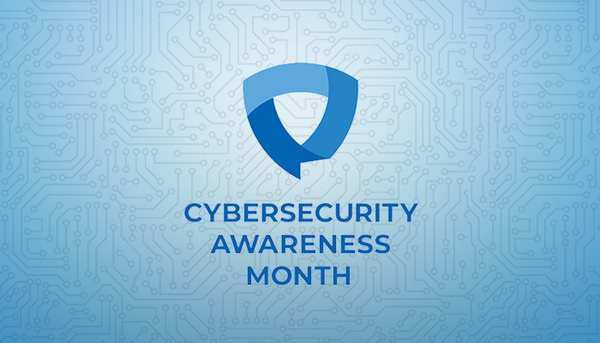
This October marks the 20 year anniversary of celebrating Cybersecurity Awareness Month. Every year, the Cybersecurity and Infrastructure Agency (CISA) and the National Cybersecurity Alliance join forces to provide resources and awareness on how to stay safe online.
This year’s theme focuses on simple actions that can be taken to protect personal information online.
In support of that theme, the Office of Information Technologies (OIT) wants to help you stay scam aware with a new video series. Learn about the latest scams, see how they work, and how to avoid falling for it. More information about these videos will be available throughout the month of October.
Cybersecurity awareness month is a great reminder to ensure the following safe practices are implemented year round.
Create Strong Passwords
Passwords are the first layer of protection for your accounts and digital resources. Follow the guidelines below to keep your passwords strong in order to protect your accounts:
- Passwords should be a minimum of 16 characters
- Avoid using names, predictable phrases, birthdays or number sequences that can be easily guessed
- Use a different password with each account you create
Use a Password Manager
The average person has between 70-100 passwords to remember. Why try to remember all those passwords when a password manager can do it for you? 1Password is available to ND faculty and staff at no cost.
1Password will create and save long and unique passwords for each of your online accounts. It is the most convenient way to safely generate, store and access your passwords.
More information about getting started with 1Password is available on this 1Password information page.
Enable Multi-factor Authentication
Combining the use of strong passwords and two-step authentication makes it more difficult for cyber-criminals to access personal account information.
By enabling this security feature, you will be required to enter two different factors to confirm your identity when logging into personal accounts.
The first factor will be something you know like a password or PIN number. The second factor will be something you have like a code sent to your cell phone, or a personal identifier such as your fingerprint or other biometric information.
Notre Dame services require two-step authentication via Okta, and many of your personal accounts offer it as well. The option to enable multi-factor authentication is usually found in your account settings under security.
Recognize & Report Phishing
Phishing messages are one of the most common ways cyber criminals try to steal personal information. Cybercriminals will often impersonate legitimate companies or people in order to make their messages appear to be more credible. These messages can be delivered via email, phone call and SMS messaging.
Cyber criminals also use more advanced tactics—making phishing attempts increasingly harder to recognize. If you have suspicions about a message, ask yourself these questions when evaluating it:
- Does the message have a sense of urgency?
- Is the message unsolicited?
- Does the message have an unusual "From" or "Reply-To" address instead of a recognizable "@nd.edu" style address?
- Does the message include a URL that doesn’t match the name of the institution it claims to represent?
- Does the message contain a link, attachment or other request to take action?
- More information on the signs of phishing and how to report phishing attempts is available in this knowledge article.
Keep Software Updated
Operating systems of devices that connect to the Internet like computers, smart watches, televisions, cameras or tablets need to be updated on a regular basis.
Software manufacturers will provide updates to address security issues, as well as introduce new features and performance enhancements for applications used on your computer and mobile devices.
It is important to apply these updates as soon as they are released. An easy way to do this is to enable automatic updates for these software applications. Additionally, you will receive an email message from the Office of Information Technologies (OIT) about urgent security updates to commonly used software on campus.
Learn how to protect yourself, your family and your devices with more tips and resources during Cybersecurity Awareness Month at staysafeonline.org/stay-safe-online.
Originally published by at oit.nd.edu on September 29, 2023.